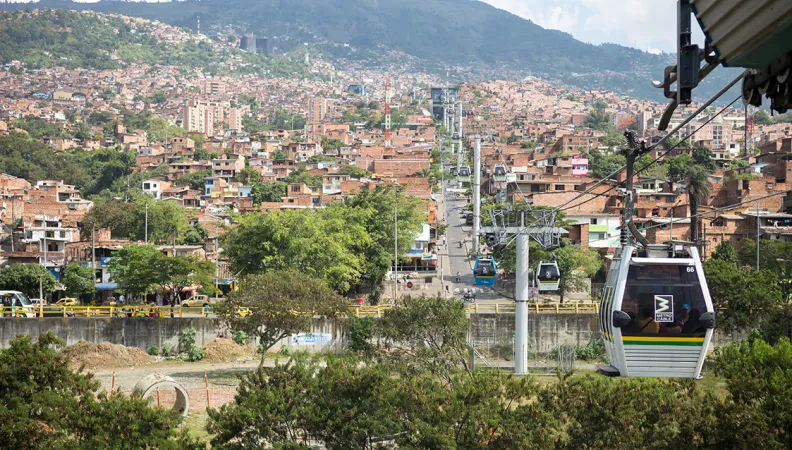Share the page
“We Cannot Develop Sustainably if we Lack the Resources”
Published on

Often overlooked in discussion of development are the financial and strategic changes required to shift economies from fossil fuels to greener alternatives – and the need to overcome lingering debt. In an interview with AFD, Colombian Deputy Finance Minister Diego Guevara calls for dialogue on the debt of emerging economies to meet the challenges of climate change.
What are the main challenges facing the Colombian government, in social, economic and environmental terms?
The main challenge lies in trying to reconcile our export model with an ecological transition. Our main export, and an important part of Colombian revenue come from oil and gas exportation. Yet we know we need to begin [an ecological] transition. And when you have such restrictions it's not easy to make this transition happen from one day to the next.
The challenge we face is to reconcile three transitions: social, economic, and ecological. Disparities are still quite high in Colombia, so we committed to fiscal reform when we arrived at the Ministry of Finance and Public Credit in August 2022 to improve social spending while maintaining fiscal sustainability, allowing us to send a message of accountability to the markets. Economically, a very substantial part of Colombia's income comes from oil and gas exports, and we want to start exploring the possibility of changing this situation through a transition of our exports, even if it will not happen overnight.
The ecological transition is difficult when you already have other transitions underway. For example, we have very few trains in Colombia. Most freight is transported by trucks, which depend on oil and diesel, which in turn contribute to global greenhouse gas emissions. However, we are working on a green reindustrialization project to address this situation. At the same time, we also need to support programs to stop deforestation, which is what the Ministry of the Environment is working on.
Further Reading: Colombia: Developing a Climate Strategy for 2050
How has AFD's GEMMES program helped you identify opportunities related to the low-carbon transition?
This cooperation project between AFD and Colombia was launched four years ago. At the time, no one was talking about the macroeconomic vulnerabilities of the ecological transition.
Now with the new government, we want to explore if we are able to stop the exploration and exploitation of oil and gas. But our macroeconomic vulnerability as concerns the energetic transition, is immediately apparent.
So I think that this model is going to be important for the public policy debate. The GEMMES model, which has been adapted to Colombia's specific situation, will therefore be important for the public debate on these issues. The next step that we want to take with AFD on this project will be to connect foreign debt and climate debt.
Further Reading: "Strong Sustainability for (truly) Sustainable Development"
How can we ensure that Colombia's development process moves in the direction of strong sustainability, i.e. that its development is indeed sustainable?
Strong sustainability is not only environmental; it is also social and economic. Economically, many emerging economies depend heavily on what is happening abroad. When the price of oil is low, Colombia receives less foreign currency and therefore sees the exchange rate of the Colombian peso fall.
We do not have a lot of industry, and we don’t produce many things, so we need to import them, and whenever there’s a fall in the exchange rate, all the prices go up. The cost of living increases immediately, because we depend so much on imports.
So we cannot aim for sustainable development if we do not have the necessary resources to devote to it. We have to work on all three aspects at the same time. But this is a huge challenge for us! Especially since 20% of our national budget is spent on servicing debt. So if we want to talk seriously about strong sustainability in emerging economies, we need to address the issue of external constraints on them. And therefore the commitment of financial players for an ecological transition that we cannot take on alone.
Organizations such as AFD and the Inter-American Development Bank (IADB) provide us with loans with good terms. They do not put much pressure on us. But private investors, who represent the majority of the financial amounts we are talking about, are only interested in one thing: that you keep paying them.
This is a problem that Colombia cannot solve on its own. It requires international cooperation, at least on a Latin American scale, especially to renegotiate debt management. I think the time has come to initiate a real dialogue.
Watch the video: Strong Sustainability: Reconciling Environmental, Social and Economic Objectives
How do you view AFD's support?
Colombia is one of AFD's most important customers. We have been granted loans with attractive interest rates to support the implementation of major climate and environmental reforms, as well as social reforms. Our various branches of government are really getting to know AFD!
We will probably strengthen this cooperation. Not long ago I spoke to the media about the second phase of the Inequality Research Facility, and I realized that AFD's work is being recognized in our country.
